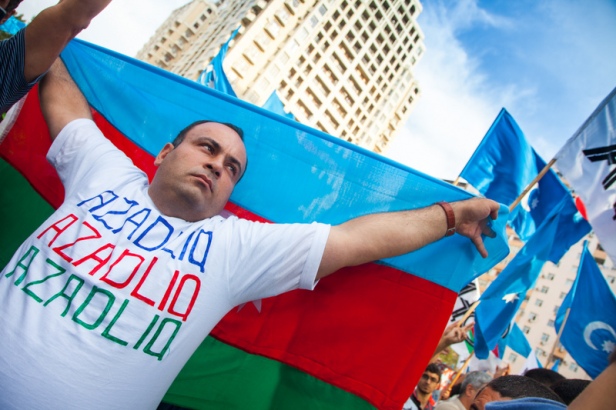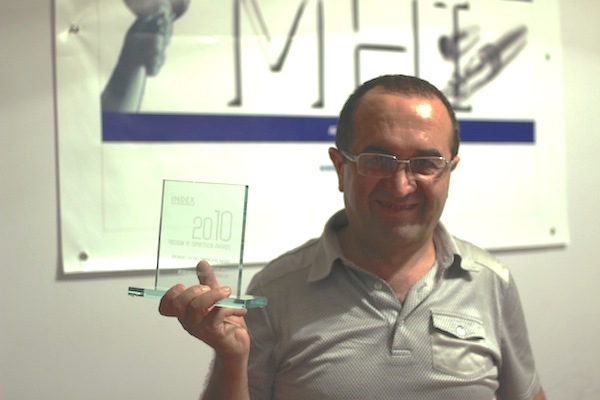Index relies entirely on the support of donors and readers to do its work.
Help us keep amplifying censored voices today.
The offices of Azerbaijani press freedom organisation Institute for Reporters’ Freedom and Safety (IRFS) were on Friday searched by police – the latest in a new clampdown by authorities on human rights groups in Azerbaijan. Human rights lawyer Intigam Aliyev also had his home searched, and has been sentenced to three months pretrial detention.
The IRSF offices were today surrounded by police officers according to reports from Azerbaijan. There are unconfirmed reports that Emin Huseynov, the head of the organisation, has been detained. He was already under a travel ban.
Over the past two weeks, human right defenders Leyla and Arif Yunus and Rasul Jafarov have been sentenced to three months of pretrial detention, facing charges including high treason, state betrayal and tax evasion. One of the country’s few remaining independent newspapers, Index Award winner Azadliq, has been forced to suspend publication due to financial troubles.
IRFS has been reporting on these and other instances of apparent state targeting of opposition voices. The NGO was founded in 2006, “in response to growing government restrictions on freedom of expression and freedom of press,” according to their mission statement. The latest global press freedom index from Reporters Without Borders ranks Azerbaijan at 160 out of 180 countries, and the recent estimates puts the number of political prisoners in the country at over 140.
The recent cases have taken place against a backdrop of heightening tensions between Azerbaijan and neighbouring Armenia, which so far has left at least 14 people dead. President Aliyev on Thursday published a series of tweets on his personal Twitter account which seemed to threaten war with Armenia. The troubled relationship between the two countries has also played a part in cases against dissidents, including Leyla Yunus who has been accused of spying for Armenia.
In May, Azerbaijan assumed chairmanship of the Council of Europe’s (COE) Committee of Ministers, whose tasks include “ensure[ing] that member states comply with the judgments and certain decisions of the European Court of Human Rights”.
In a statement on Friday, the COE said Secretary General Thorbjørn Jagland has “revealed his deep concern at the arrest of Azerbaijan human rights defender Leyla Yunus and the prosecution case against her husband Arif”.
“By stifling dissent, Azerbaijan is failing to comply with its international obligations which require safeguarding freedom of expression, assembly and association. It is necessary that Azerbaijan reverse the situation,” COE Commissioner for Human Rights Nils Muiznieks has told Azerbaijani media.
Index on Censorship, along with 60 other NGOs, has called for the immediate and unconditional release of Leyla and Arif Yunus and Rasul Jafarov. Today Index reiterates this call and raised its concerns with Britain’s Foreign and Commonwealth Office.
“It is deeply worrying that while international attention is directed at conflicts elsewhere, Azerbaijan appears to be resuming oppression of dissent,” said Jodie Ginsberg, CEO of Index on Censorship. “This is a country showing blatant disregard for human rights while presiding over an institution that describes itself as the continent’s ‘leading human rights organisation.’ The fellow members of the Council of Europe must do more to show Azerbaijan its actions must cease immediately.”
This article was published on August 7, 2014 at indexoncensorship.org

An opposition protest in Baku, September 2013 (Image Demotix/Aziz Karimov)
The tone was set the day we arrived in Azerbaijan, 17 September 2013. Journalist Parviz Hashimli, was arrested and detained by officers of the Ministry of National Security after a raid on the office of newspaper Bizim Yol.
Hashimli is an influential journalist as the editor of Moderator.az website and chair of the Center for Protection of Political and Civil Rights. He was accused of drugs smuggling and the illegal possession of weapons. According to the Institute for Reporters’ Freedom and Safety (IRFS) in Baku, “it is unclear exactly what prompted the arrest of Hashimli and raid on BizimYol newspaper. However, some experts believe it was linked to a series of leaks reporting on developments in the state machinery, published shortly before his arrest on www.moderator.az news source.”
Human rights activists that we met believe that Hashimli’s arrest is yet another attempt to intimidate the press in the run-up to the October election. This week, the editor of Tolyshi Sado newspaper, Hilal Mamedov, was sentenced to five years in prison.
At least eight journalists are currently imprisoned in retaliation for their reporting on sensitive issues. This is the backdrop to Azerbaijan’s election next week, an election that is being fought in one of the least free countries on earth.
Journalists are not the only group affected by arrests under fabricated charges. Youth movements have been particularly targeted since March 2013. Index met with relatives of some of the seven NIDA members arrested last March and April for “drug possession” or “suspicion of inciting violence”. NIDA is a youth movement calling for more democracy in Azerbaijan. The seven members arrested were particularly active on social media and known for their criticism of the authorities.
On 19 September, we met former Index on Censorship award winner Rashid Hajili, who is a lawyer and chair of the Media Rights Institute. “Since 2003, the situation has gradually worsened,” says Hajili. While the human rights situation is deteriorating on the eve of the presidential elections, Hajili sees the situation as the result of a decade-long “shift toward authoritarianism”. Not only have the authorities of the country ignored their international commitments – such as decriminalising defamation – but they have adopted legislation imposing new restrictions on fundamental freedoms.

Rashid Hajili with his Index on Censorship Award (Image: Melody Patry)
In May, Azerbaijan’s parliament adopted regressive legislation extending criminal defamation provisions to online content. Azerbaijanis now face potential fines of up to AZN 1,000 (approximately USD $1,280), or prison sentences of up to three years for items they post online, including on Facebook. The chilling effect is so severe that individuals refrain from even “liking a friend’s controversial status”, says a young Azeri. “We are aware that social media are monitored,” she adds.
As the Aliyev regime tightens the screws, space for free expression is shrinking and prospects for free and fair elections grow slimmer. Three years after receiving Index’s Law and Campaigning Award, Rashid Hajili is still busy fighting repression against the right to freedom of expression in the country. The number of his clients prosecuted for being critical to the government keeps increasing. “There is very limited space for free expression,” says Hajili. “Many independent or critical voices go online, to online newspapers and to social media”. But the online space is not safe. While many in the civil society or international diplomacy have denounced criminal prosecutions for online publications, and intimidation of journalists, Azerbaijan routinely ignores criticism of its human rights record by international bodies.